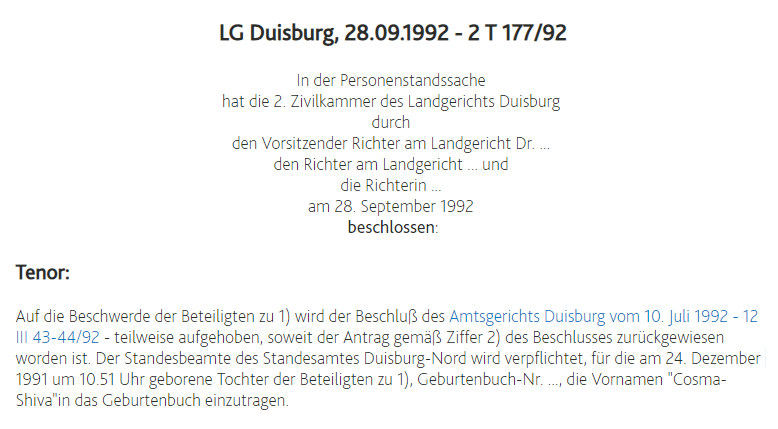German names – astonishing laws for names in Germany

German names? What about it?
People in India bitch about the lack of freedoms just because they have to abide by the rules of society and live within the laws. Foolish Indian activists want absolute freedom without any rules or laws. Strangely, the societies they hail in Europe have rules that you need to abide by. For example, the naming laws in Germany. Yes, did you know that there are strict laws and rules per which you can only name your kids a certain way? Courts can over-rule you if you name your kid something that they find derogatory. So, translated in the Indian context, if India had a similar set of rules, the stupid celebs would not have been allowed to name their kid “Taimur”!! Just like Hitler will not be allowed in Germany.
For example, the laws to name a kid. First, the parents make an application to the office of vital statistics, the Standesamt, (in the area in which the child was born) for registering of a name. If the office rejects then the parents can appeal. If you lose the appeal you will have to choose another name. And what are the rules by which Germans can name their kids?
German names – rules that should be followed
The rules are:
1. No hyphenated names – like Leonard Matthias Grunkin-Paul! Why? Because if both husband and wife come with two hyphenated names – then their kids have FOUR hyphenated names and the grandkids have EIGHT and so on… Of course, it is not anywhere assumed that the generations down the line could be smarter to see it and abandon the practice themselves!
And why no hyphens? Dr. Eichhoff-Cyrus, who hyphenated her own surname after marriage but is not allowed to pass it on to her children, explains that the concern is hyphenation multiplication. If a double-named boy grew up to marry and have children with a double-named woman, those children could have four names, and their children could have eight, and their children could have 16. The bureaucracy shudders. (source)
2. The First Name should indicate the GENDER of the person. If it doesn’t then the second name should be given to “clarify’ the matter! One obviously wonders how do transgenders and eunuchs choose their names in that country? Well, the answer lies in changing the name of that person at that time in accordance with the Transsexual Act. This is one of the reasons why a change of name is allowed.
3. Cannot use last names or the names of objects or products as first names: So you cannot have your child take the first name as Schmitz or even Kirsche (Cherry) or Stone
4. No names that can negatively affect the well being of the child: So some names that have not been allowed are Lenin, McDonald, Schnucki. In 1998, the Dusseldorf court had rejected a baby name – Chenekwahow Migiskau Nikapi-Hun-Nizeo Alessandro Majim Chayara Inti Ernesto Prithibi Kioma Pathar Henriko – on the grounds that “mother’s wish to honor multiculturalism shouldn’t result in an awkwardly long name for the child”
The courts ensure that the names of the kids do not expose the child to ridicule or by being offensive. For example, a person named Sabsudin wanted to change his name and was allowed to change to Sebastian Sabsudin. The reason from the court was “although it is an Islamic name that shows his membership in the Islamic community, it sounds foreign to a German, is difficult to pronounce, and subjected the child to ridicule from his classmates”.
That brings to the changing of name, which is strictly regulated. Changing the name is allowed only in cases of adjusting as per the Transsexual Act, after an adoption, or in order to Germanize a foreign name.
Two interesting names that may be of interest to some Indians which were allowed where:
Kiran (Bundesverfassungsgericht [BVerfG] [Federal Constitutional Court], docket no. 1 BvR 576/07)
Cosma-Shiva (LG Duisburg [Regional Court Duisburg], docket no. 2 T 177/92)
In case of Cosma-Shiva, the regional court in Duisburg allowed the name Cosma-Shiva after an appeal by the parents. Basically saying
Following the appeal of the parties to 1), the order of the District Court of Duisburg of 10 July 1992 – 12 III 43-44 / 92 – was set aside in part, in so far as the application under paragraph 2) of the order was dismissed. The registrar of the registry office of Duisburg-Nord is obliged to register for the daughter of the participants born on December 24, 1991 at 10:51 am to 1), birth certificate no. … to enter the first name “Cosma-Shiva” in the birth book.
To be fair, the names which are acceptable keep changing over the years as the society becomes more multi-cultural. And the courts want people to have the freedom to name their kids the way they want (thank God for small mercies!). Of course, all that freedom comes with restrictions.
The Federal Constitutional Court held with regard to non-gender specific names that the fact that the registrar has to register the name and the gender of the baby does not mean that children need gender-specific names. According to the court, the Instructions for Registrars are non-legislative acts without any legal force and can therefore not limit the constitutionally guaranteed parental right to name a child. It stated that gender-neutral names generally do not adversely affect the well-being of the child, because the child can nonetheless identify with its gender.
The constitutional right of the parents to name their child as they please is only limited if the name choice could adversely affect the well-being of the child, for example by exposing the child to ridicule or by being offensive.
Here is a hilarious video on the names that were not allowed in Germany.
Some of the names that have not been allowed have been:
Schmitz (one of the most common last names in Germany) (OLG Köln [Higher Regional Court Cologne], docket no. 16 Wx 239/01)
Borussia (Germans associate the name with the soccer club Borussia Dortmund) (AG Kassel [District Court Kassel], docket no. 765 III 56/96)
Pfefferminze (peppermint) (name of a healing and spice plant which will submit the child to ridicule) (AG Traunstein [District Court Traunstein], docket no. 3 UR III 2334/95)
Verleihnix (Unhygienix) (name of a cartoon character) (Amtsgericht Krefeld, docket no. 32 III B 42/89)
Stone (a child cannot identify with it, because it is an object and not a first name) Amtsgericht Ravensburg [District Court Ravensburg], docket no. 1 GR 371/93)
Lord (according to the court, in Germany, “Lord” is only known as a title for English nobility or as a name for god, even if it might be an acceptable name in the United States or Sweden) (OLG Zweibrücken [Higher Regional Court Zweibrücken], docket no. 3 W 212/92)
Möwe (seagull) (name of a bird which people find a nuisance and is seen as a pest and would therefore degrade the child) (BayObLG [Bavarian Higher Regional Court], docket no. BReg. 3 Z 1/86)




